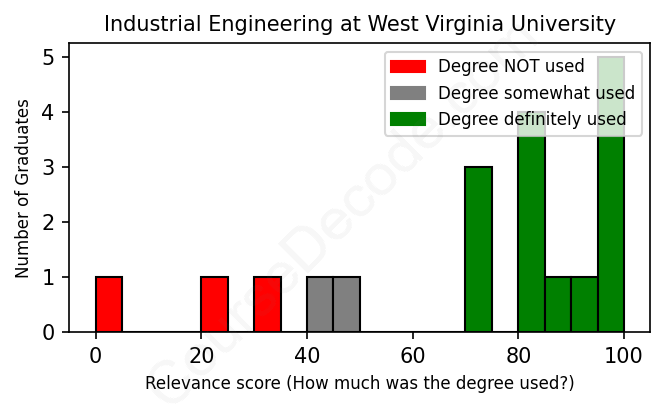
First, some facts. Of the Industrial Engineering graduates from West Virginia University we've analyzed , here's how many have used (or NOT used) their degree in their career:

These are estimates based on AI analysis of 19 LinkedIn profiles (see below).
The verdict? Slightly above average. Overall, with an average relevance score of 71%, Industrial Engineering graduates from West Virginia University have a slightly higher likelihood (+4%) of finding work in this field compared to the average graduate across all fields:
And for comparison, here's the chart for all profiles we've looked at across all degrees.
Also, after graduating, only 26% of these graduates have pursued further education other than another Bachelor's degree (such as a Masters degree or other), compared to the average across all profiles of 35%. This suggests a Bachelors degree is enough for most Industrial Engineering graduates, and it's normal to look for work straight after graduation.
See the details:
|
Relevance score: 96% We think this person has gone into a career highly relevant to their degree. We think this person has gone into a career highly relevant to their degree.
DEGREE INFOGraduated in 2020 from West Virginia University with a Bachelor of Science - BS in Industrial Engineering. No other secondary education since. JOB HISTORY SINCE GRADUATIONAssociate Consultant Center for Entrepreneurial Studies and Development, Inc. May 2020 - Aug 2020 Business Technology Analyst  Deloitte Jan 2021 - Apr 2023 Consultant  Deloitte Apr 2023 - Present ABOUT[NAME REMOVED] McCoy is a second-year analyst at Deloitte Consulting who joined the firm in January 2021 after obtaining a B.S. in Industrial Engineering from West Virginia University where he graduated summa cum laude. While at WVU, [NAME REMOVED] served as the head industrial engineering teaching assistant, a role where he managed a team that facilitated process improvement and LEAN methodologies to students. He also has over three years of PMO experience through school, various internships, and post-graduate work.At Deloitte, [NAME REMOVED] has served as a functional analyst on an incremental renewal project for a State client and as a facilitation thread lead for Deloittes internal GPS investments. Currently, [NAME REMOVED] is performing data analysis and providing supply chain expertise to help support a DoD clients digital transformation goals. |
The top 10 most common jobs done by the graduates we've analyzed (ranked most common to least) are:
From the profiles of those who studied Industrial Engineering at West Virginia University, it's clear that a variety of job roles are represented, but some common themes emerge. A significant number of graduates have landed positions in engineering and project management roles, especially within companies like Mylan, Smith Services, and Amazon. Many of these jobs directly relate to industrial engineering by utilizing principles like process optimization, systems analysis, and quality management. For instance, roles such as Industrial Engineer, Quality Assurance Manager, and Continuous Improvement Engineer highlight a consistent application of core skills learned during their degree program.
However, not all job titles reflect a strong relevance to industrial engineering. Some graduates have pursued careers in sales, law, or other fields that do not directly apply engineering principles, like the attorney role or various sales and managerial positions. While some of these positions may still benefit from a background in industrial engineering—especially in aspects like problem-solving and efficiency—their primary focus often strays from the technical and analytical skills emphasized in the degree. Overall, it seems that graduates with more technical roles or those in industries focused on manufacturing and operations have maintained stronger links to their academic background in industrial engineering.
Here is a visual representation of the most common words in job titles for Industrial Engineering graduates (this is across all Industrial Engineering graduates we've analyzed, not just those who went to West Virginia University):

Graduates from West Virginia University's Industrial Engineering program seem to have quite promising career trajectories. Typically, many of them start in roles like Industrial Engineer, Quality Engineer, or even Operations Manager right after graduation, which makes sense since these positions align well with their degree. For example, those who graduated in 2010 found themselves in solid engineering roles at companies like FedEx and Mylan, where they quickly climbed the corporate ladder to positions like Project Manager or Industrial Engineering Manager within a few years. It's clear that they are leveraging their education effectively and finding their niches in various industries.
Fast forward five to ten years later, and you see a lot of these graduates moving into managerial or specialized roles, often with a focus on continuous improvement and operational excellence. For instance, many alumni have taken on leadership positions, such as Senior Manager or Director roles, showing that they’re not just sticking to entry-level positions. A few have diversified their paths into fields like law or consulting, indicating flexibility and broad applicability of the skills gained from their Industrial Engineering degree. Overall, it looks like a decent number of graduates are finding good careers relevant to their field, which bodes well for future students considering this program. So, if you're thinking about studying Industrial Engineering, you might be on a solid path to success!
Getting a Bachelor’s degree in Industrial Engineering at West Virginia University or anywhere else can be pretty challenging, but it's not the hardest degree out there. You’ll definitely deal with some tough math and engineering concepts, like calculus and statistics, so it's important to have a good grasp of those subjects going in. Plus, you'll dive into things like systems engineering and optimization, which can get pretty complex. That said, if you stay organized and keep up with your coursework, it’s manageable. Just be prepared to put in some solid study hours, work on group projects, and maybe even tackle a few late-night study sessions! Overall, it's like balancing a mix of math, science, and real-world problem-solving, and if you like those topics, you might find it more enjoyable than daunting.
Most commonly, in the LinkedIn profiles we've looked at, it takes people 4 years to finish a Bachelor degree in Industrial Engineering.
Looking at these Industrial Engineering grads from West Virginia University, it seems like most of them have landed solid jobs and are likely making decent money, especially as they advance in their careers. For example, those who started with roles at big companies like FedEx and Mylan have moved up to management positions, which typically come with higher salaries. You’ve also got a couple of folks who’ve ventured into roles in consulting and project management at reputable firms, which usually pay well too. Even fresh grads are entering promising positions in engineering and consulting, indicating a good starting salary. Overall, it looks like they’re doing pretty well compared to many other career paths!
Here is a visual representation of the most common words seen in the "about" section of LinkedIn profiles who have a Bachelor degree in Industrial Engineering (this is across all Industrial Engineering graduates we've analyzed, not just those who went to West Virginia University). This may or may not be useful:

Here are all colleges offering a Bachelor degree in Industrial Engineering (ordered by the average relevance score of their Industrial Engineering graduates, best to worst) where we have analyzed at least 10 of their graduates:
| College | Score | Count |
|---|---|---|
 Iowa State University Iowa State University
|
88 | 11 |
 North Carolina State University North Carolina State University
|
87 | 12 |
 California Polytechnic State University-San Luis Obispo California Polytechnic State University-San Luis Obispo
|
87 | 15 |
 Texas A&M University Texas A&M University
|
83 | 39 |
 Purdue University Purdue University
|
81 | 36 |
 University of Central Florida University of Central Florida
|
80 | 23 |
 Georgia Institute of Technology Georgia Institute of Technology
|
80 | 59 |
 Penn State University Penn State University
|
79 | 16 |
 Texas Tech University Texas Tech University
|
79 | 10 |
 University of Pittsburgh University of Pittsburgh
|
79 | 15 |
 University of Washington University of Washington
|
78 | 12 |
 University of Arkansas University of Arkansas
|
78 | 11 |
 University of Wisconsin-Madison University of Wisconsin-Madison
|
76 | 13 |
 University of Illinois at Urbana-Champaign University of Illinois at Urbana-Champaign
|
73 | 15 |
 West Virginia University West Virginia University
|
71 | 19 |
 Clemson University Clemson University
|
69 | 23 |
 University of Florida University of Florida
|
64 | 11 |